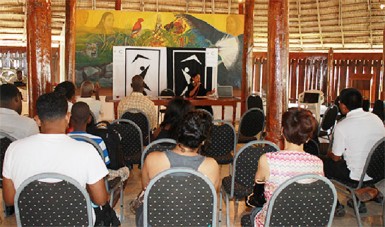Speaker of the National Assembly Raphael Trotman yesterday said that the perception of the Alliance for Change (AFC) as an “oppositional party” is worrying in light of its intended mission to address racial tensions in Guyana.
Trotman, one of the founders and a former leader of the AFC, made the declaration during a forum at the Umana Yana to address ethnic and cultural issues facing Guyanese citizens, organised as part of the Janus Cultural Policy Initiative (JCPI) Conversations on citizenship.
Trotman acknowledged that political parties, including his own, contribute to the racial tensions in Guyana.

His statement was made in response to comments by Evan Radhay Persaud, a representative of the Indian Arrival Committee (IAC). According to Trotman, groups such as the IAC and the African Cultural and Development Association (ACDA) perhaps unintentionally aim for race hegemony in the celebration of their cultures, thereby contributing to division within the country. However, he admitted the AFC, which had started as a party of change, has somewhat contributed to some of these divisions as well.
“When I dreamed up of the AFC, I did so primarily to address this ethnic problem,” he said.
According to Trotman, he had recognised the need to create a bridge between races in Guyana and had believed that the creation of a new political party would help. However, he said the party was being viewed as an “oppositional party” and this concerned him due to the divide caused by such a perception.
Other participants also noted close link between politics and racial tensions in Guyana during the three-day conversations.
Yesterday, 20 to 25 citizens from varying backgrounds turned out to share their experiences on a number of issues, including dealing with racism, cultural identity, and political conflict.
Many expressed the need for closer relations between races by an overhaul of traditional ideas.
Participants also had the opportunity to speak on stigmas attached to many groups and noted the importance of influencing children from an early age. “Kids are like blank pages; what you write on them, that’s what they’ll learn,” one contributor said.
“Speak for your brother… recognise your brother as a Guyanese, as a family member that faces these trials with you,” another member said. However, the issue of indoctrination was pointed out as a major challenge. “We are unwilling to let go of the past,” Sara Bharrat of JCPI said. “Even today we continue to live in the past.”
This past, Bharrat believes, has left the races divided for decades.
One woman of Chinese ancestry spoke on her experiences of discrimination both as a child and as an adult. In particular, she noted an article written about Chinese businesspersons and their steadily increasing numbers in Guyana. She pointed out that in Guyana’s history, Indo-Guyanese were usually the predominant business-owners. However, she said, this had never become an issue like that of a “Chinee takeover.” “The article just portrayed Chinese as greedily coming to Guyana, gobbling up everything, evading taxes. It was just very negative,” she said. She explained that the culture of those of Chinese ancestry is not to “take over” or conquer but rather to make contributions. “We are taught to live peacefully with the persons with co-exist with in society,” she added.
The sessions, held at the Umana Yana, began on Thursday and focused on a number of topics. Speakers included Bharrat and Nadia Sagar. Ruel Johnson, founder of JCPI, explained that forum is one that allows everyone to speak openly with equal weight.
“The overall point of this is to inform the heritage component of our National Cultural Policy,” Johnson said. He went on to say that having the policy shaped by consultations with citizens was of great importance.
“The idea for Janus is to look at how culture can help us go forward in our post-2015 development agenda,” Johnson added.
He further said though Guyana was a co-chair for the Inter-American Committee on Culture (CIC), it is yet to have a cultural policy.
“The underdevelopment the strategy is supposed to counter has a cultural basis,” he pointed out. “Our constitution must pay more attention to culture.”
Though JCPI is funded by the international Prince Claus Fund for Culture and Development, Johnson maintained that events planned by JCPI are “completely conceived by Guyanese” with no restrictions. The JCPI believes that many of Guyana’s social and subsequent developmental problems can be solved culturally.
Despite its successes, Johnson opined that much more needed to be done and he pointed out the need for a replication and improvement beyond the project by other entities.





